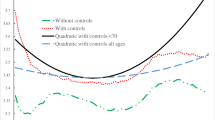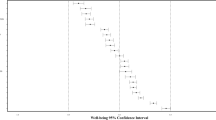Abstract
The aim of the current paper was to investigate the moderating role of both objective and subjective country-level social (income) inequality on the relationship between employment status and well-being. The focus was on young Europeans (aged 16–29) and a multilevel perspective with individuals nested within 28 countries was adopted. Based on conservation of resources theory, the central hypothesis was that labor market (LM) insecurity will be particularly detrimental for young Europeans’ well-being in countries characterized by high (vs. low) inequality. The results showed that unfavorable LM positions indeed impair young Europeans cognitive (i.e., life satisfaction) and affective (i.e., negative affect) well-being. We found support for the moderating role of both objective (i.e. the income share held by the lowest 10% of the country) and perceived social inequality on the relationship between employment status and life satisfaction. Namely, the negative relationship between unfavorable LM conditions (and particularly job insecurity) and youth well-being tended to be weaker or nonexistent in more equal societies. Our findings highlight the important role of social (income) inequality, both objective and perceived, in understanding the conditions under which unemployment and job insecurity may be particularly detrimental for young individuals’ well-being.


Similar content being viewed by others
Notes
For more details see“2013 EU-SILC module on well-being. Assessment of the implementation” by Eurostat at https://ec.europa.eu/eurostat/documents/1012329/1012401/2013+Module+assessment.pdf.
References
Alesina, A., Di Tell, R., & MacCulloch, R. (2004). Inequality and happiness: Are Europeans and Americans different? Journal of Public Economics, 88, 2009–2042.
Becker, G. S. (1993). Human capital: A theoretical and empirical analysis, with special reference to education (3rd ed.). Chicago: The University of Chicago Press.
Bjørnskov, C., Dreher, A., Fischer, J. A. V., Schnellenbach, J., & Gehring, K. (2013). Inequality and happiness: When perceived social mobility and economic reality do not match. Journal of Economic Behavior and Organization, 91, 75–92.
Bouazzaoui, B., & Mullet, E. (2002). Employment and family as determinants of anticipated life satisfaction: Contrasting young adults’ and elderly people’s viewpoints. Journal of Happiness Studies, 3, 129–152.
Bynner, J., & Parsons, S. (2002). Social exclusion and the transition from school to work: The case of young people not in education, employment, or training (NEET). Journal of Vocational Behavior, 60, 289–309.
Chung, H., Bekker, S., & Houwing, H. (2012). Young people and the post-recesssion labour market in the context of Europe 2020. Transfer: European Review of Labour and Research, 18, 301–317.
De Witte, H. (2005). Job insecurity. Review of the international literature on definitions, prevalence, antecedents and consequences. SA Journal of Industrial Psychology, 31, 1–6.
Deci, E. L., & Ryan, R. M. (2000). The “what” and “why” of goal pursuits: Human needs and the self-determination of behavior. Psychological Inquiry, 11, 319–338.
Diener, E. (2000). Subjective well-being: The science of happiness and a proposal of a national index. American Psychologist, 55, 34–43.
Diener, E., Inglehart, R., & Tay, L. (2013). Theory and validity of life satisfaction scales. Social Indicators Research, 112, 497–527.
Eckersley, R. (2011). A new narrative of young people’s health and well-being. Journal of Youth Studies, 14, 627–638.
Eichhorn, J. (2013). Unemployment needs context: How societal differences between countries moderate the loss in life satisfaction for the unemployed. Journal of Happiness Studies, 14, 1657–1680.
Eichhorn, J. (2014). The (non-) effect of unemployment benefits. Variations in the effect of unemployment on life-satisfaction between EU countries. Social Indicators Research, 119, 389–404.
Eurobarometer (2009). Eurobarometer 72.1: Poverty and social exclusion, social services, climate change, and the national economic situation and statistics, August-September 2009. Retrieved July 26, 2017, from https://zacat.gesis.org/webview/.
Eurostat (2014). Archive: Impact of the economic crisis on unemployment. Retrieved July 26, 2017, from http://ec.europa.eu/eurostat/statistics-explained/index.php/Archive:Impact_of_the_economic_crisis_on_unemployment.
Eurostat (2016). Dataset: Gini coefficient of equivalised disposable income - EU-SILC Survey. Retreived June 22, 2016 from http://ec.europa.eu/eurostat/data/database.
Fehr, E., & Schmidt, K. M. (1999). A theory of fairness, competition, and cooperation. Quarterly Journal of Economics, 114, 817–868.
Ferrer-i-Carbonell, A., & Gërxhani, K. (2004). How important is methodology for the estimates of the determinants of happiness? The Economic Journal, 114, 641–659.
Fiori, F., Rinesi, F., Spizzichino, D., & Di Giorgio, G. (2016). Employment insecurity and mental health during the economic recession: An analysis of the young adult labour force in Italy. Social Science and Medicine, 153, 90–98.
Frey, B. (2008). Happiness. A revolution in economics. Cambridge: The MIT Press.
Frey, B., & Stutzer, A. (2002). Happiness and economics. How the economy and institutions affect wellbeing. Princeton and Oxford: Princeton University Press.
Furnham, A. (1982a). Explanations for unemployment in Britain. European Journal of Social Psychology, 12, 335–352.
Furnham, A. (1982b). Why are the poor always with us? Explanations for poverty in Britain. British Journal of Social Psychology, 21, 311–322.
Gijsberts, M. (2002). The legitimation of income inequality in state-socialist and market societies. Acta Sociologica, 45, 269–285.
Headey, B., Kelley, J., & Wearing, A. J. (1993). Dimensions of mental health: Life satisfaction, positive affect, anxiety and depression. Social Indicators Research, 29, 63–82.
Hobfoll, S. E. (1989). Conservation of resources: A new attempt at conceptualizing stress. American Psychologist, 44, 513–524.
Hobfoll, S. E., & Lieberman, J. R. (1987). Personality and social resources in immediate and continued stress resistance among women. Journal of Personality and Social Psychology, 52, 18–26.
Jiang, L., & Probst, T. (2014). Organizational communication: A buffer in times of job insecurity? Economic and Industrial Democracy, 35, 557–579.
Keller, T., Megdeyesi, M., & Tóth, I. G. (2010). Analysing the link between measured and perceived income inequality in European countries. Research note no 8, European Commission, Directorate-General “Employment, Social Affairs and Equal Opportunities”.
Kelley, J., & Zagorski, K. (2005). Economic change and the legitimation of inequality: The transition from socialism to the free market in central-east Europe. In D. B. Bills (Ed.), The shape of social inequality: Stratification and ethnicity in comparative perspective. Research in Social Stratification and Mobility (pp. 319–364). Amsterdam: Elsevier.
Layte, R., & Whelan, C. T. (2014). Who feels inferior? A test of the status anxiety hypothesis of social inequalities in health. European Sociological Review, 30, 525–535.
Leung, K. (2018). Chines culture, modernization, and international business. International Business Review, 17, 184–187.
Loury, G. (1977). A dynamic theory of racial income differences. Women, Minorities, and Employment Discrimination, 153, 86–153.
Lübker, M. (2004). Globalization and perception of social inequality. ILO World Commission on the Social Dimension of Globalisation. Policy Integration Department Working Paper No. 32. Retreived July 26, 2017, from http://www.ilo.org/public/english/bureau/integration/download/publicat/4_3_320_wp-32_wcsdg.pdf.
McKee-Ryan, F. M., Song, Z., Wanberg, C. R., & Kinicki, A. J. (2005). Psychological and physical well-being during unemployment: A meta-analytic study. Journal of Applied Psychology, 90, 53–79.
Muffels, R., & Fouarge, D. (2004). The role of European welfare states in explaining resource deprivation. Social Indicators Research, 68, 299–330.
OECD (2017). Understanding the socio-economic divide in Europe. Retrieved July 19, 2018, from https://www.oecd.org/els/soc/cope-divide-europe-2017-background-report.pdf.
Oshio, T., & Kobayashi, M. (2011). Area-level income inequality and individual happiness: Evidence from Japan. Journal of Happiness Studies, 12, 633–649.
Paul, K. I., & Moser, K. (2009). Unemployment impairs mental health: Meta-analyses. Journal of Vocational Behavior, 74, 264–282.
Peiró, J. M., Sora, B., & Caballer, A. (2012). Job insecurity in the younger Spanish workforce: Causes and consequences. Journal of Vocational Behavior, 80, 444–453.
Pittau, M., Zelli, R., & Gelman, A. (2010). Economic disparities and life satisfaction in European regions. Social Indicator Research, 96, 339–361.
Ravallion, M., & Chen, S. (1996). What can new survey data tell us about recent changes in distribution and poverty? Policy Research Working Paper, 1694, World Bank.
Rokicka, M., & Kłobuszewska, M. (2016). The short-term economic consequences of insecure labour market positions in EU-28. EXCEPT Working Papers, WP No. 10. Tallinn University, Tallinn. Retreived August 10, 2019, from http://www.except-project.eu/working-papers/.
Rözer, J., & Kraaykamp, G. (2013). Income inequality and subjective well-being: A cross-national study on the conditional effects of individual and national characteristics. Social Indicators Research, 113, 1009–1023.
Schneider, S. (2016). Income inequality and subjective wellbeing: Trends, challenges, and research directions. Journal of Happiness Studies, 17, 1719–1739.
Senik, C. (2004). When information dominates comparison. Learning from Russian subjective panel data. Journal of Public Economics, 88, 2099–2123.
Shariff, A. F., Wiwad, D., & Aknin, L. B. (2016). Income mobility breeds tolerance for income inequality: Cross-national and experimental evidence. Perspectives on Psychological Science, 11(3), 370–380.
Silla, I., De Cuyper, N., Gracia, F. J., Peiró, J. M., & De Witte, H. (2009). Job insecurity and well-being: Moderation by employability. Journal of Happiness Studies, 10, 739–751.
Sinn, H. W. (1996). Social insurance, incentives and risk taking. International Tax and Public Finance, 3, 259–280.
Sverke, M., Hellgren, J., & Naswall, K. (2002). No security: A meta-analysis and review of job insecurity and its consequences. Journal of Occupational Health Psychology, 7, 242–264.
Valdmanis, V. M. (2015). Factors affecting well-being at the state level in the United States. Journal of Happiness Studies, 16, 985–997.
Van den Broeck, A., Sulea, C., Vander Elst, T., Fischmann, G., Iliescu, D., & De Witte, H. (2014). The mediating role of psychological needs in the relation between qualitative job insecurity and counterproductive work behavior. Career Development International, 19, 526–547.
Veenhoven, R. (2005). Apparent quality-of-life in nations: How long and happy people live. Social Indicators Research, 71, 61–86.
Virtanen, M., Kivimäki, M., Joensuu, M., Virtanen, P., Elovainio, M., & Vahtera, J. (2005). Temporary employment and health. A review. International Journal of Epidemiology, 34, 610–622.
Voßemer, J., Gebel, M., Täht, K., Unt, M., Högberg, B., & Strandh, M. (2018). The effects of unemployment and insecure jobs on well-being and health: The moderating role of labor market policies. Social Indicators Research, 3, 1229–1257.
Weiss, H. M., & Cropanzano, R. (1996). Affective Events Theory: A theoretical discussion of the structure, causes and consequences of affective experiences at work. In B. M. Staw & L. L. Cummings (Eds.), Research in organizational behavior: An annual series of analytical essays and critical reviews (Vol. 18, pp. 1–74). US: Elsevier Science/JAI Press.
Wilkinson, R. G., & Pickett, K. E. (2009). Income inequality and social dysfunction. Annual Review of Sociology, 35, 493–511.
World Bank (2016). Poverty and Equity Data: Income share hold by lowest 10%. Retreived June 22, 2016 from http://data.worldbank.org/.
Wulfgramm, M. (2014). Life satisfaction effects of unemployment in Europe. The moderating influence of labour market policy. Journal of European Social Policy, 24, 258–272.
Acknowledgements
This project has received funding from the Estonian Research Council grant “My time, Your time, Our time. Household time allocation—choice or inevitability?” (PUT1182).
Author information
Authors and Affiliations
Corresponding author
Additional information
Publisher's Note
Springer Nature remains neutral with regard to jurisdictional claims in published maps and institutional affiliations.
Rights and permissions
About this article
Cite this article
Taht, K., Xanthopoulou, D., Figgou, L. et al. The Role of Unemployment and Job Insecurity for the Well-Being of Young Europeans: Social Inequality as a Macro-Level Moderator. J Happiness Stud 21, 2355–2375 (2020). https://doi.org/10.1007/s10902-019-00184-w
Published:
Issue Date:
DOI: https://doi.org/10.1007/s10902-019-00184-w




